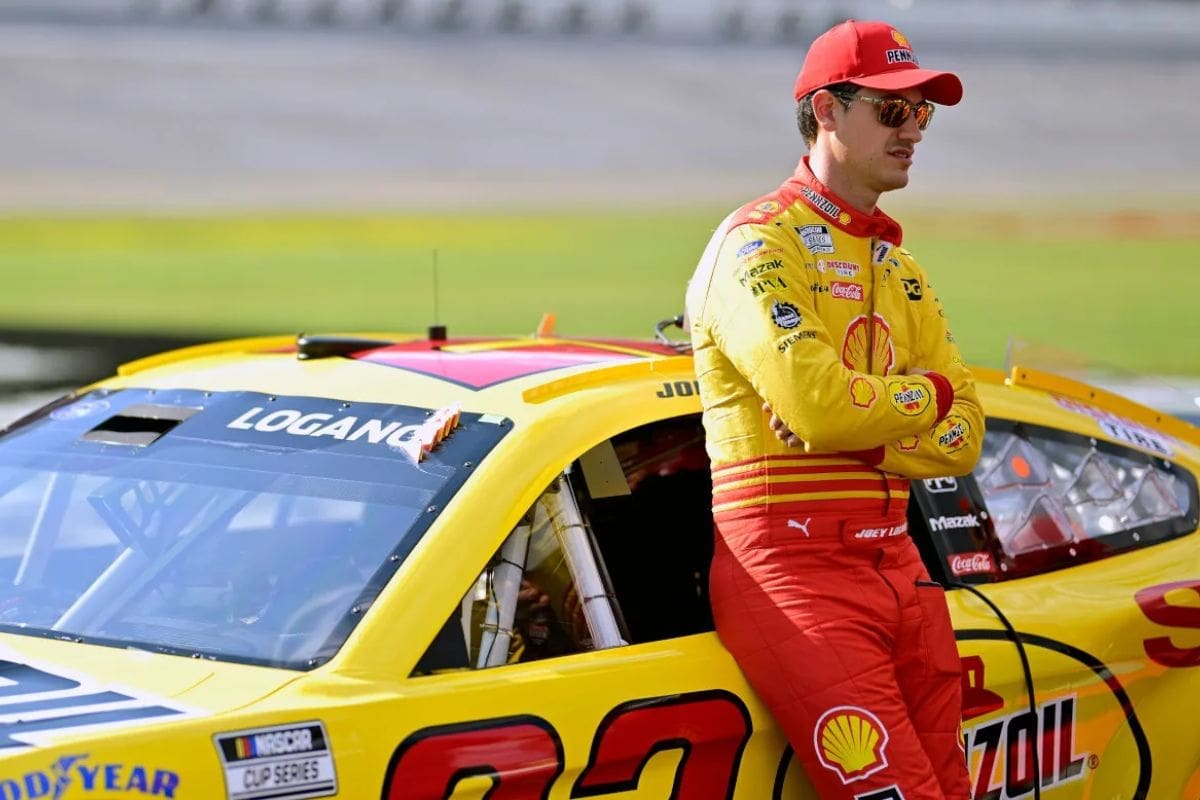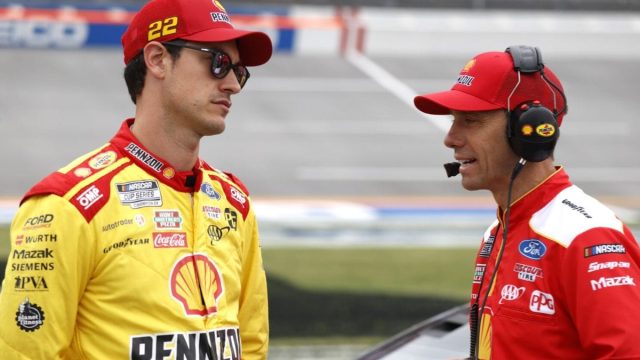Joey Logano’s Crew Chief Slams NASCAR: Joey Logano‘s crew chief’s recent condemnation of NASCAR’s officiating as a ‘joke’ highlights a deeper restlessness within the sport, where inconsistencies in the enforcement of aggressive racing tactics have raised critical questions about fairness and integrity. This sentiment is not isolated; it echoes a growing discontent among team leaders who are increasingly frustrated with a lack of clear guidelines from NASCAR. As the sport grapples with these challenges, the implications for driver safety, fan engagement, and the very essence of competitive racing remain precarious. What steps might NASCAR take to restore credibility in this contentious environment?
Key Highlights
- Joey Logano’s crew chief criticized NASCAR’s recent officiating, calling the events a “joke” in terms of racing standards.
- Concerns were raised about inconsistencies in NASCAR’s enforcement of racing conduct and rules.
- The crew chief’s frustration highlights a perceived erosion of competitive integrity within the sport.
- Calls for clearer guidelines and regulations have emerged to ensure fair competition in NASCAR.
Crew Chief’s Criticism
Paul Wolfe’s scathing criticism of NASCAR highlights a growing discontent within the sport regarding the perceived erosion of competitive integrity. Wolfe’s remarks come in the wake of a contentious race outcome where his driver lost the lead under questionable circumstances, prompting him to question the legitimacy of the competition itself. His assertion that the scenario was ‘just a joke‘ emphasizes a profound frustration that is resonating among drivers, teams, and fans similarly.
“It’s just a joke to call that racing anymore, And at some point, it’s up to NASCAR to step up and set the precedent. What’s acceptable? And to call that acceptable, I don’t know how anyone that has watched racing for any amount of time can. To put in all the hard work and all the effort and money and what goes into this. It was a tough race, and something like that, that’s not racing. And at some point, NASCAR is going to have to make the right call on these things. And they missed it tonight with allowing that and giving that car the win.” – Wolfe
Wolfe’s call for NASCAR to define what constitutes acceptable racing behavior reflects a broader concern that the sport may be drifting into a domain where outcomes are dictated by manipulation rather than skill. By highlighting the extensive investment of time, effort, and resources put forth by teams, he articulates a sentiment that the essence of racing is being compromised. The implication is clear: if NASCAR does not take decisive action to enforce standards, it risks alienating stakeholders who expect professionalism and fairness.
“It’s up to NASCAR to get this under control. If NASCAR controls this, then this is never a problem. But now you get into this, ‘Oh, I owe him one,’ and that whole game. That’s not racing. At some point, we’re still a racing series, I thought. Are we just going to fill things with gimmicks and wreck people to win? That’s not right. That’s not racing.” – Wolfe
Moreover, Wolfe’s concerns regarding the emergence of a culture of retribution—where drivers feel compelled to ‘owe’ each other on the track—signal a shift away from the competitive spirit that has historically defined NASCAR. His insistence that ‘this is still a racing series’ serves as a rallying cry for those advocating for a return to a purer form of competition.
“We all put too much into this. There’s a lot of sponsors putting a lot into this, backing us to come out here and do a professional job. That’s not professional what happened tonight. If NASCAR thinks that’s professional then we’ve really lost sight of what’s going on here.” – Wolfe

Race Outcome and NASCAR Response
The controversial outcome at Richmond Raceway, where Austin Dillon’s victory came under scrutiny for aggressive driving tactics, has intensified the debate surrounding NASCAR’s enforcement of competitive standards. Dillon’s actions—specifically, bumping Joey Logano and then sending Denny Hamlin into the wall—have raised questions about the integrity of the sport and the limits of permissible contact.
NASCAR’s response, articulated by vice president of competition Elton Sawyer, indicates a willingness to review these incidents closely, suggesting that the sport acknowledges the fine line between aggressive racing and reckless driving. Sawyer noted that the last lap was ‘awfully close to the line,’ indicating a recognition of the potential for penalties.
“our sport has been a contact sport for a long time. We always hear ‘Where’s the line?’ I’d say the last lap was awfully close to the line. We’ll take a look at all the available resources from audio to video, we’ll listen to spotters, crew chief and drivers, and anything rises to a level that we feel we need to penalize, we’ll do that on Tuesday.” – Sawyer
However, this raises several critical points:
- Consistency of Enforcement: Will NASCAR apply its rules uniformly across different incidents, or will discretion lead to favoritism?
- Impact on Competitiveness: Does allowing aggressive tactics undermine the competitive spirit of the race and the safety of drivers?
- Fan Perception: How will the fans react to the perceived leniency towards aggressive driving, especially when it affects popular drivers?
- Long-term Implications: What precedent does this set for future races, and how might it influence driver behavior in the playoffs?
Drivers’ Reactions
Reactions from drivers following the controversial finish at Richmond Raceway reveal deep frustrations over NASCAR’s perceived leniency towards aggressive racing tactics. Joey Logano, visibly incensed, articulated his discontent by suggesting that NASCAR should rescind Austin Dillon’s victory, labeling the prevailing circumstances as a ‘joke.’ His vehement remarks emphasize a broader sentiment among competitors who feel that the integrity of racing is compromised by unchecked aggressive actions.
Denny Hamlin echoed Logano’s sentiments, lamenting the lack of accountability for actions that have tangible consequences on competitors’ performance and safety. Hamlin’s assessment of an ‘invisible line’ in the rulebook highlights a critical concern: without enforceable standards, the essence of competitive racing is diluted. His frustration is compounded by the realization that aggressive tactics yield rewards, as evidenced by Dillon’s ascent from 30th to a top-16 position, despite the ensuing chaos.
“It’s a joke, The whole thing’s a joke. I’ve got nothing good to say. What do you want me to do? What do you want me to tell you? I’m going to wreck him. Is that what you want me to say? I’m not going to say that. I got to go race. And I’ve got to go win.” – Logano
The overarching theme in these reactions is a call for NASCAR to re-evaluate its approach to racing conduct. Drivers are increasingly aware that the current climate fosters a culture where winning at all costs outweighs the need for sportsmanship.
Hamlin’s reflection on the need for maturity in racing suggests that the series is at a crossroads, grappling with the implications of its regulatory framework. As the sport evolves, the necessity for a balanced, equitable approach to racing conduct becomes ever more pressing, ensuring that the legacy of NASCAR remains intact.
“I was just minding my own business and got hooked in the right rear, Unfortunate. It just killed our car, killed my shoulder. Tough ending for sure.”
“It’s an invisible line in our rulebook. There’s provisions to cover it if NASCAR chose to do something about it, but they’re not, right? Because we’ve seen in other series and year after year, they watch things like that, and they think it’s OK, and it’s just giving a terrible example for the young group out there.”
“But Austin goes from 30th to points to now he’s going to be in the top 16. And so no matter what repercussions he might have down the line, it doesn’t matter because it was worth it from their standpoint, which I understand that. So it’s just part of it.” – hamlin

Austin Dillon’s Defense
Austin Dillon’s defense of his aggressive racing tactics emphasizes a complex dynamic within NASCAR, where past actions by veteran drivers serve as justification for his controversial victory. In a sport that often prioritizes winning above all, Dillon’s assertion that he was simply emulating the aggressive actions of established drivers resonates with both supporters and critics. His remarks illuminate a culture where the line between tactical racing and reckless behavior is often blurred.
“This is my first opportunity to get a win in two years, “I mean it’s racing, and both of them have been in the other end of other things like that. It’s my first time, and man, when i get an opportunity, I just got to be aggressive.”
“I see these guys do it a lot often. My move (on Logano) was pretty aggressive. (The Hamlin move) was just a reaction as I was coming back left (after hitting Logano). But man we won a race. We’ll take it. It’s what we needed.” – Dillon
Dillon’s reasoning can be distilled into several key points:
- Historical Precedent: He acknowledges that both Denny Hamlin and Joey Logano have made similar aggressive moves to secure victories, suggesting a shared ethos among drivers.
- Personal Stakes: With two years without a win, Dillon emphasizes the urgency and necessity of seizing opportunities, which he felt justified his actions.
- Competitive Nature: He asserts that racing inherently demands aggression, arguing that hesitancy may cost drivers critical chances to succeed.
- Racing Culture: Dillon highlights a broader aspect of NASCAR where aggressive tactics are not only expected but often celebrated, challenging the notion that his actions were out of line.
Controversial Elements and Reactions
Controversial elements surrounding Austin Dillon’s aggressive tactics during the race have ignited a fierce debate within the NASCAR community, particularly regarding the implications of perceived instructions from his team and the nature of competition in the sport. The incident involving Denny Hamlin and Dillon has raised questions about the ethical boundaries of racing and the extent to which teams can influence drivers’ actions through radio communication.
Dillon’s actions, particularly the bump that sent Hamlin spinning, have been framed by some as a reflection of a larger, more competitive ethos that persists in NASCAR. Yet, the denial from team owner Richard Childress about any explicit directives to ‘wreck’ Hamlin sharply contrasts with the growing scrutiny of driver conduct. Childress’s insistence on the absence of intentional instructions complicates the narrative, suggesting a clear divide between competitive instinct and premeditated aggression.
“I didn’t say that, I didn’t hear anyone say it and I was on the radio. Everybody was quiet. We left it up to him to do his job. Hell no, nobody said, ‘Go out and wreck him, do what you got to do.’ Nobody. I was on the radio the whole time.” – Childress
Compounding this controversy is Dillon’s self-justification, describing his actions as instinctual rather than deliberate. His claim of a reaction rather than intention undermines the complexity of racing dynamics, where split-second decisions can lead to notable consequences.

News in Brief: Joey Logano’s Crew Chief Slams NASCAR
The recent criticisms from Joey Logano’s crew chief highlight a considerable discontent among team leaders regarding NASCAR’s officiating standards.
This situation reveals deeper issues concerning the consistency and fairness of racing regulations, potentially weakening the integrity of competition.
As calls for clearer guidelines and accountability grow, NASCAR faces the challenge of addressing these concerns to sustain trust among fans and stakeholders, ultimately determining the future engagement and credibility of the sport.
ALSO READ: Joey Logano Calls Out Austin Dillon After His Shady Victory

It was short track racing. They are so up set because they didn’t win the race. It was a great race last night and wish the tickets where not so much.
Austin has not earned the respect of a Dale Earhart.